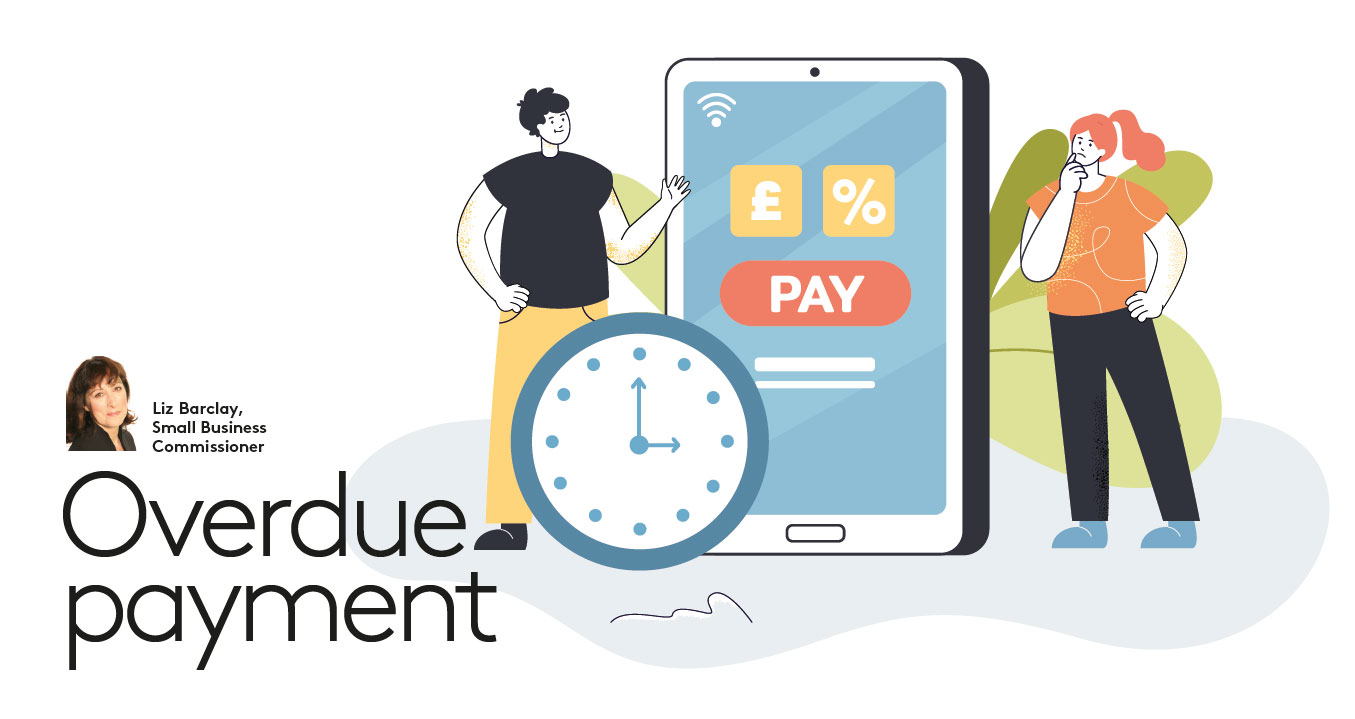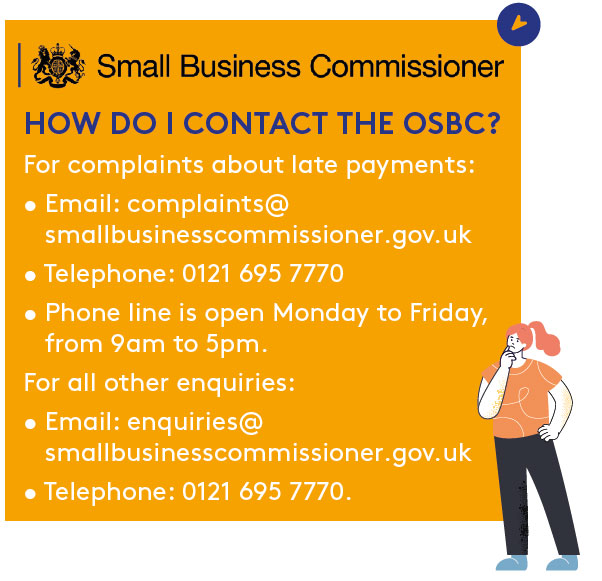
The Office of the Small Business Commissioner was established in December 2017 to tackle the late payment culture.
This disproportionately impact the small business sector.
We provide a free service to small firms to help them get overdue payments from their larger customers.
We also advise firms on the proactive steps they can take to prevent their payments being delayed or not being paid at all.
Our work has never been so important.

Late Payments and the cost of doing business crisis
At the best of times, late payments are a leech on small businesses’ ambitions, cash flow and growth. In the current economic climate, they are a showstopper. As the cost of doing business soars, small firms (those with fewer than 50 employees) are most likely to be struggling to survive. Every penny counts when it comes to paying for wages, materials, fuel and energy bills.
Every penny paid late increases anxiety, puts stress on cash flow, and increases the risk of closure. In 2021, 49% of payments to small businesses were late, with more than 10% of those being paid over a month after they were due. Recent reporting from the accounting software company, Xero, suggests the situation in 2022 could be worse.
In September, Xero recorded that the average late payment time for small firms had increased for the fifth consecutive month to 8.3 days, with the average ‘time to be paid’ consistently increasing over the same period to 30.5 days. In the first half of 2022 EY’s figures suggest average payment days stands at 36 days. This data is limited by sample size, but it paints a bleak picture for the small business sector. As a business owner could you afford to wait nearly 40 days to be paid?
Even 20 or 30-day payment terms may put your cash flow at risk. All of this is happening while official inflation figure for general inflation hovers around 10%. The reality is firms are more likely to be managing inflation in the 30-40% region. In a period where lenders are tightening their purse strings and interest rates are continuing to climb, fair payment terms and reliable payment practices are critical to small businesses’ cash flow sustainability and economic survival.
THE QUESTIONS TO BE ANSWERED ARE:
• WHAT CAN YOU DO TO REDUCE THE RISK OF LATE PAYMENTS FROM YOUR CUSTOMERS?
• HOW CAN YOU GET BACK OVERDUE PAYMENTS?
Both these questions prompt a few follow-ups, which we’ll unpack below but if we’ve missed anything, you’ll find the information you need on the OSBC website or in our FAQs.
What can you do to reduce the risk of late payments from your customers?
It’s vital that as a small business owner you get your invoices right. That may seem obvious, but we know from research that a large percentage of invoices are submitted with mistakes on them and if an invoice isn’t correct there will be the risk that your payment will be delayed and sometimes not paid at all.
There may be different, specific things to remember about invoices that might apply to your own business, but there are some important general points that should apply to almost everyone:
- You need to know who to send the invoice to. The person who gives you the work may not be the person who pays you. In smaller firms there may be only one person to commission work and pay
the invoices, but bigger firms are more likely to have more complicated payment and approval processes - You need to know when you will be paid. Some firms pay in ‘30 days’, but they mean 30 days after the end of the month in which your invoice has been submitted. Don’t get caught out and get from the customer the date on which you can expect your money to arrive in your account
- if you have to pay out for materials or labour before you carry out the work, try to negotiate to be paid upfront to cover those costs. You could also try to negotiate payment in instalments
- Keep your invoice template as simple as possible but make sure you include everything that the customer needs to make the invoice payable
- If you need a purchase order number for your invoice chase that as soon as the work’s been done, or even when it has first been commissioned. If there are delays in getting that number that will mean the invoice is submitted later than necessary and payment will be delayed in turn
- Submit your invoice as soon as possible [after work is completed], in line with the contractual terms you agreed with your customer. It’s tempting to wait until the end of the month and do all your invoices at once but that could leave you short of cash while waiting for several payments to come in
- There will be some information that you need to include on every invoice as a minimum, including:
» Invoice date
» Invoice number
» Purchase order number (if you’ve been given one)
» Payment due date
» Payment terms, as agreed in the contract
» Bank account details - Your invoice should set out clearly the work that has been completed and what the payment relates to. If a significant piece of work has been broken into sub-tasks, specify those tasks as well
- Check that the quoted figure on the invoice matches what was agreed before work began
- If you’re comfortable accepting more than one payment method, make clear what the alternatives are, e.g., credit card or PayPal payments. Make it as easy as possible for the customer to pay you
- Try to build a friendly relationship with the person responsible for paying you. You want to be the person who gets paid before they go home on a Friday. Call them the week before your payment is due to make sure they have everything they need, and your money will come through on time.

What is the Office of the Small Business Commissioner?
The Office of the Small Business Commissioner (OSBC) is an independent public body established to tackle late payment and unfavourable payment practices across the UK private sector.
The OSBC considers complaints from small businesses (businesses with fewer than 50 staff) about payment problems they have with their larger customers (50 or more employees), making non-binding recommendations on how the parties should resolve their disputes.
The Office also administers the Prompt Payment Code (PPC), a voluntary code of practice that sets standards for payment practices between organisations and their suppliers. Visit the PPC website to find out more about the Code.
How can they help me?
The OSBC provides general advice and information to small businesses on late payment issues and payment practices and investigates complaints to help get overdue invoices paid. It’s remit covers:
- Resolving disputes and investigating unpaid invoices
- Advising on how to get contracts and invoices right
- Signposting small businesses to existing support and dispute resolution services. You can visit the OSBC Website for guidance, resources and tips on handling late payments and steps you can take to prevent issues related to late payments.




